Dell Storage SC4020 review
Dell’s Storage SC4020 brings affordable enterprise data tiering and fast flash-based arrays to SMBs
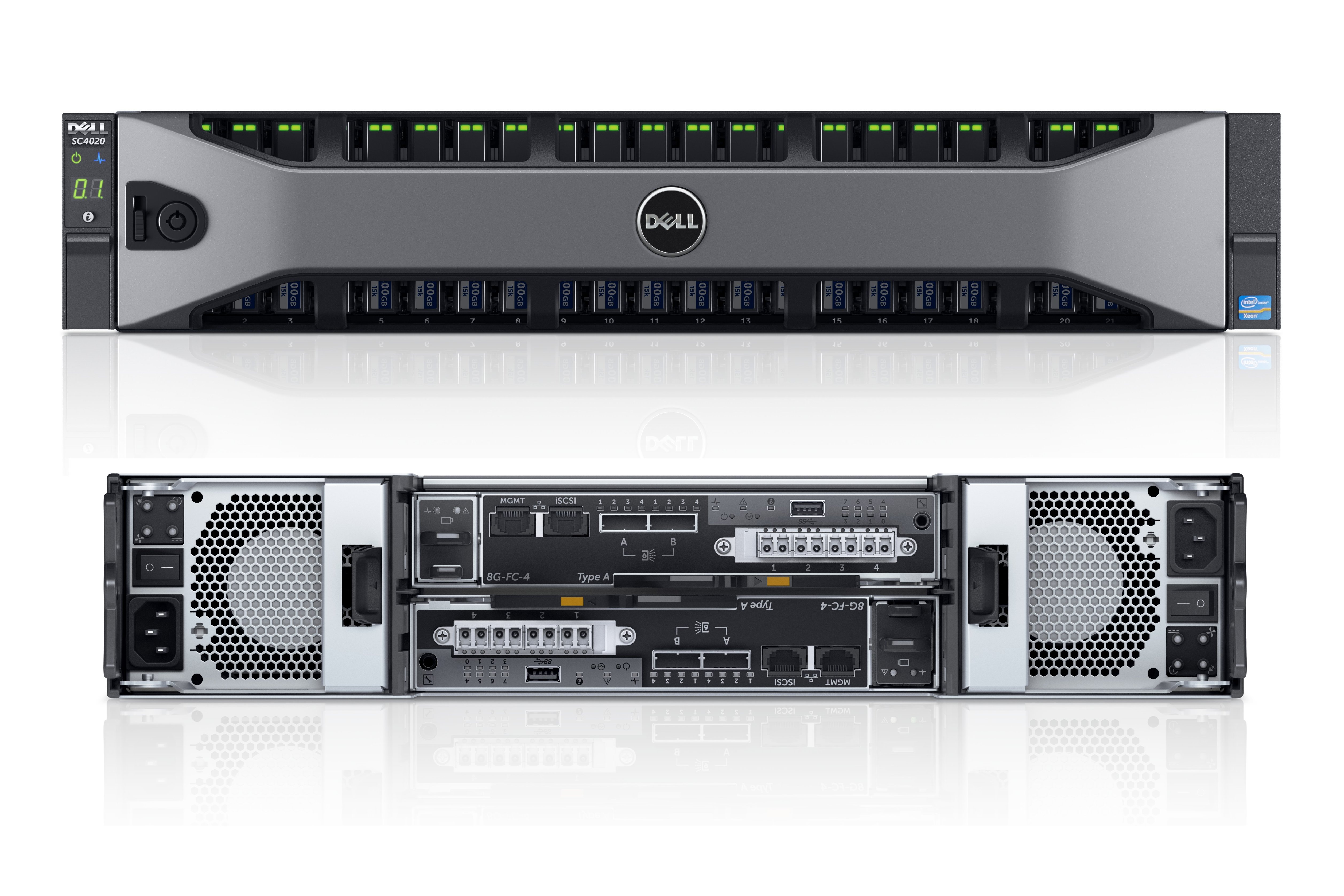

The SC4020 offers enterprise storage virtualisation at a price that’ll appeal to smaller businesses. It’s easy to deploy, has a high expansion potential and performance of its SLC SSD arrays is impeccable.
-
+
Stunning SLC SSD performance; Good value, Swift deployment; Automated data tiering
-
-
No 12Gbps SAS support

Dell's Storage SC8000 arrays deliver an impressive range of storage optimisation features but their hefty price tag puts them way beyond the reach of SMBs. That's about to change as the new Storage SC4020 delivers the same enterprise level features but at a much lower price point.
The SC4020 amalgamates everything into a compact 2U chassis with 24 hot-swap SFF drive bays. It runs exactly the same Storage Center (SC) software as its bigger brother and is designed for businesses with more modest expansion plans.
It comes as standard with dual active controllers each with 2.5GHz E3-1265L v2 Xeons and 16GB of battery protected DDR3 cache. Controllers are available with quads of 8Gbps FC ports and Dell has just announced models with dual 10GbE SFP+ ports.
The controllers have dual 6Gbps SAS expansion ports which accept its SC200 and SC220 expansion shelves. The drive count can go to 120 and Dell offers SSDs, 15k SAS, 10k SAS and NL SAS as options.
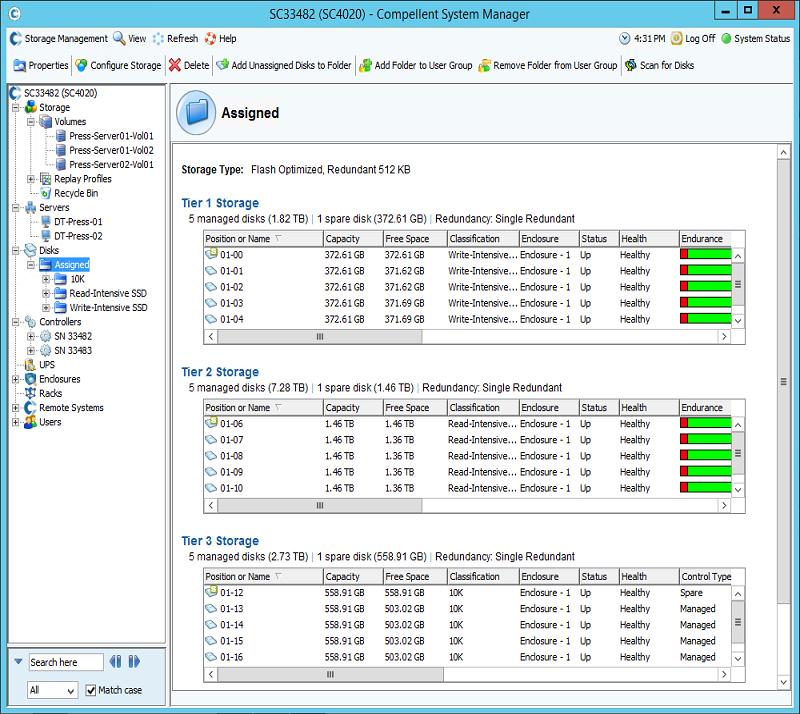
The SC4020 supports SLC and MLC SSDs and automatically places them in the most appropriate storage tier
Storage in a flash
Dell's Fluid Data architecture migrates data through tiers dependent on access frequency. Up to three tiers are possible and a new feature is support for write-intensive SLC SSDs in the top tier and read-intensive MLC SSDs in the second tier.
Dell's thinking here is that businesses can use fewer SSDs to get better performance than a big bank of SAS drives making flash-based storage more affordable. However, the choice is yours as tiers can be made up of any supported drive type.
Dell's dynamic block architecture (DBA) does all the hard work as it uses metadata tables to keep track of all blocks. It maintains details such as the number of accesses, when it was written, which virtual volume it belongs to and so on.
DBA uses this information to determine which storage tier a data block should reside on and when to move it up or down the tiers. Consequently, a volume can contain data blocks that reside on different tiers dependent on their usage patterns.
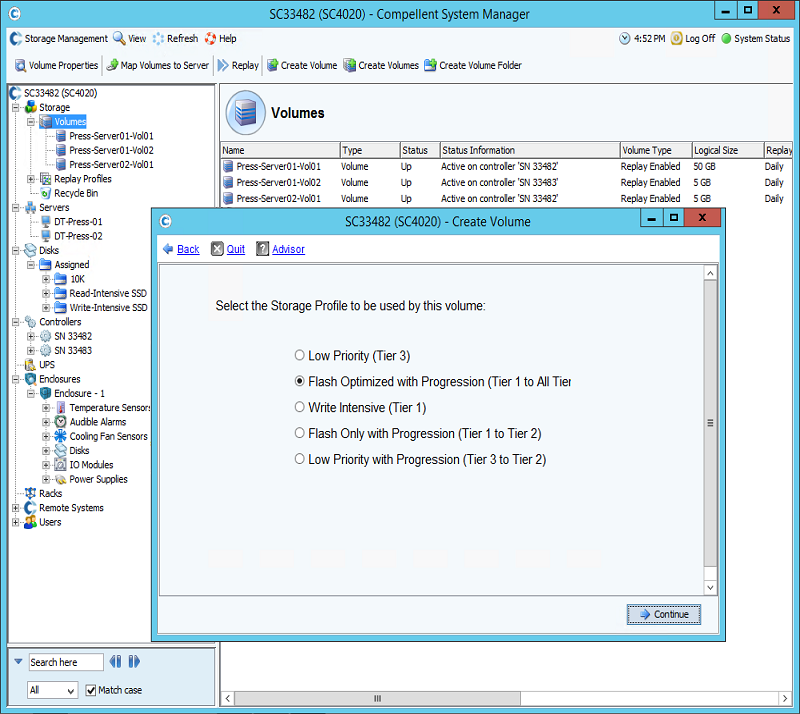
During volume creation you use predefined storage profiles to decide which tiers the data will use
Auto-tiering
DBA handles tier creation as it categorises drives by their type, interface and, where applicable, spin speed and places them in the most appropriate tier. Our system had six 400GB SLC and six 1.6TB MLC SSDs which DBA placed in the first and second tiers.
Even RAID array creation is done for you and DBA selects them to suit each tier with options for RAID0, 5, 6, 10 and the new dual-mirrored arrays. All physical storage is amalgamated into a single Disk Folder pool and the SC4020 combined with the expansion shelves can currently present a maximum pool size of 480TB.
From the SC4020's Storage Center Manager console, we created virtual volumes within the Disk Folder. Thin provisioning is enabled by default and we found it a swift process to assign volumes to our FC hosts.
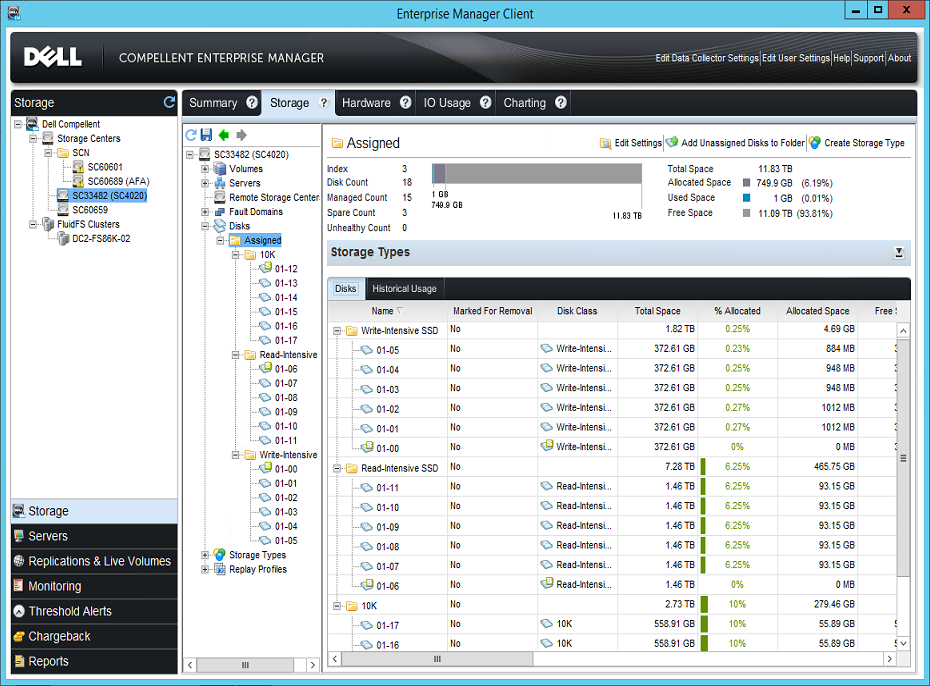
Dell's Enterprise Manager can be used to manage multiple storage arrays from a single console
Top tier performance
We tested with two PowerEdge R720 servers running Windows Server 2012 R2 and equipped with QLogic dual-port 8Gbps FC adapters. With one server logged onto a virtual volume over a dual MPIO FC link, Iometer reported an impressive raw sequential read rate of 12.2Gb/sec.
Using a 4KB request size Iometer returned 160,000 and 90,000 IOPS for sequential and random read operations. Our random write test measured a steady 34,100 IOPS while our database test using a 66/34 per cent mix of random reads and writes came back with a speedy 36,000 IOPS.
With the second server in the mix, Iometer reported impressive cumulative rates of 318,000 and 170,000 IOPS for sequential and random reads. The random write test reported 60,000 IOPS while the database test on both servers saw a cumulative 52,000 IOPS.
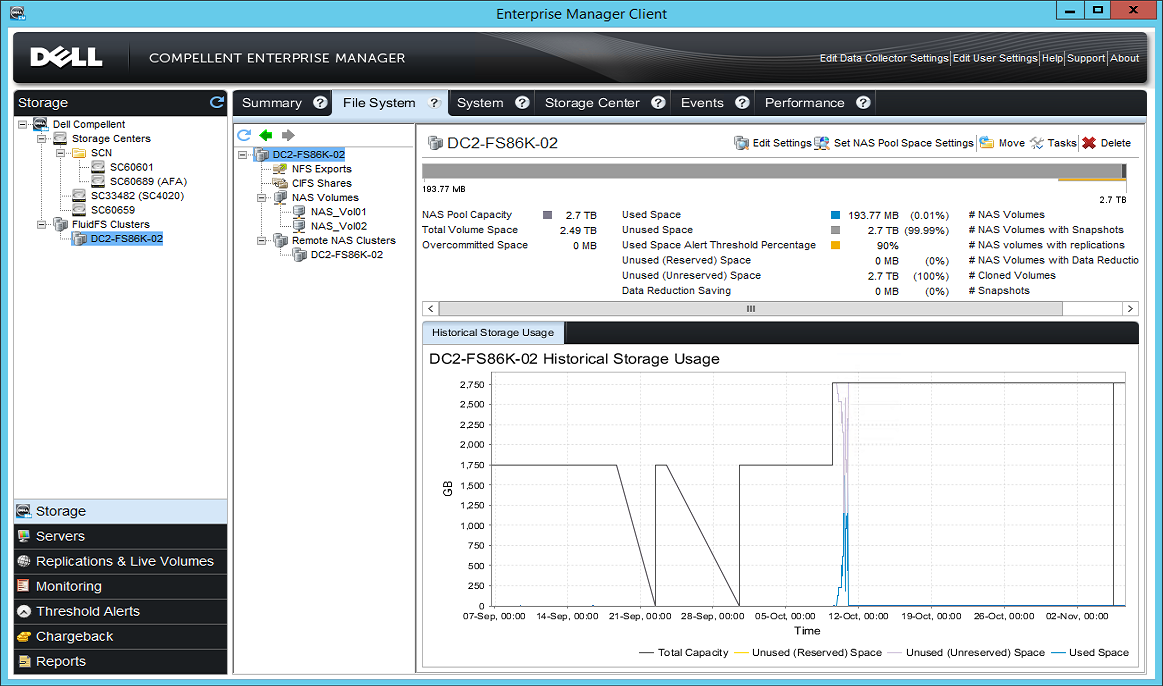
The SC4020 can link up with Dell's FS8600 and use its tiered storage to present NAS shares
Instant Replay
Instant Replays are Dell's answer to snapshots and are configured during volume creation where you set a frequency schedule and decide how many to keep for file versioning purposes. When two tiers of SSDs are present, Instant Replays are automatically taken to read-intensive MLCs making rollback operations much faster.
The Virtual Port feature allows all physical ports in the controller to be used rather than reserving some for failover. The controllers also have 10GbE iSCSI ports dedicated to replication between multiple appliances.
NAS support is available with the optional FS8600 head unit. This is connected to the SC4020 controller over FC or iSCSI networks where it uses Disk Folder volumes to present network shares over its own Gigabit or 10GbE ports.
Along with the integral Storage Center Manager web interface, multiple appliances can be managed using Dell's freely available Enterprise Manager. Along with standalone deployments in SMBs, the SC4020 is aimed at those that want to deploy storage to remote offices and replicate to a central SC8000 and in these scenarios the Enterprise Manager can look after them all from one console.
Overall
The Storage SC4020 looks very affordable with a starting configuration comprising dual 8Gbps FC controllers and twelve 1TB NL SAS drives coming in at 19,300. It includes all the Fluid Data storage optimisation features in Dell's SC8000 so it's easy to deploy and manage and we found performance to be impressive.
Verdict
The SC4020 offers enterprise storage virtualisation at a price that’ll appeal to smaller businesses. It’s easy to deploy, has a high expansion potential and performance of its SLC SSD arrays is impeccable.
Chassis: 2U rack
Storage: 24 x hot-swap SFF drive bays
Power: 2 x 580W hot-plug PSUs/fans
Dual controllers each with the following:
CPU: 2.5GHz E3-1265L v2 Xeon
Memory: 16GB DDR3 cache with BBU
Array support: RAID 0, 5, 6, 10 and 10 DM
Expansion: 2 x 6Gbps SAS (max 120 drives)
Internal ports: 2 x 6Gbps SAS
External ports: 4 x 8Gbps FC or 2 x 10GbE SFP+
Software: Dell Storage Center 6.5 upwards
Management: Dell Storage Center Manager, Dell Enterprise Manager
Warranty: 3yrs on-site 24/7 NBD
Get the ITPro daily newsletter
Sign up today and you will receive a free copy of our Future Focus 2025 report - the leading guidance on AI, cybersecurity and other IT challenges as per 700+ senior executives
Dave is an IT consultant and freelance journalist specialising in hands-on reviews of computer networking products covering all market sectors from small businesses to enterprises. Founder of Binary Testing Ltd – the UK’s premier independent network testing laboratory - Dave has over 45 years of experience in the IT industry.
Dave has produced many thousands of in-depth business networking product reviews from his lab which have been reproduced globally. Writing for ITPro and its sister title, PC Pro, he covers all areas of business IT infrastructure, including servers, storage, network security, data protection, cloud, infrastructure and services.
-
 AI will chew through the same amount of energy as Japan by 2030
AI will chew through the same amount of energy as Japan by 2030News The energy demand of AI data centers will top that of Japan by the end of the decade, new research shows – and that’s providing that energy grids can even keep up.
By Nicole Kobie Published
-
 Nvidia braces for a $5.5 billion hit as tariffs reach the semiconductor industry
Nvidia braces for a $5.5 billion hit as tariffs reach the semiconductor industryNews The chipmaker says its H20 chips need a special license as its share price plummets
By Bobby Hellard Published
-
 Business leaders are having a crisis of confidence over data literacy
Business leaders are having a crisis of confidence over data literacyNews A Salesforce survey reveals business leaders don't trust their data, or their ability to make the most of it
By Emma Woollacott Published